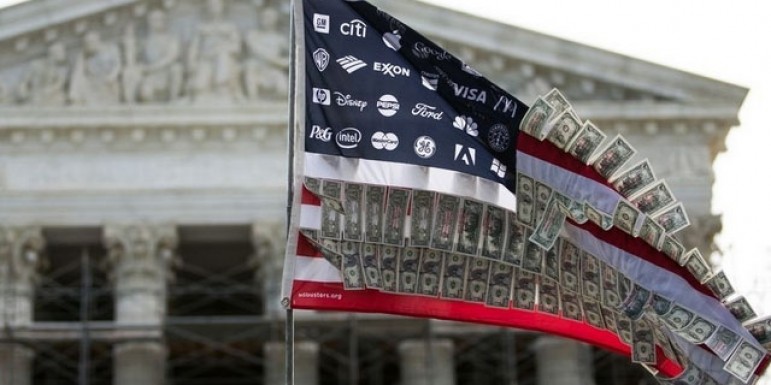
Democratic auction
The verity was officially confirmed last week: this is the best democracy money can buy.
New Yorker humorist Andy Borowitz summarized the news thus: “By a five-to-four decision, the United States Supreme Court today defended the right of the wealthiest Americans to own the United States government.”
The problem is that his formulation is neither satirical nor exaggerated for comical purposes. It reports the facts in a very precise manner.
Last Wednesday (April 3), the U.S. Supreme Court issued a ruling in the case “McCutcheon v. Federal Exchange Commission” wherein it struck down limitations on the total aggregate amount that an individual may donate to political candidates, parties or political committees.
The majority ruling, written by the Chief Justice, John Roberts, argues that this decision is based on freedom of expression. It rejects that it would lead to the corruption of the electoral process and affirms that the limits imposed by the current law are struck down because “the only type of corruption that Congress may target is quid pro quo corruption,” not because those donations grant greater access or political influence.
“The line between quid pro quo corruption and general influence must be respected in order to safeguard basic First Amendment rights [freedom of expression rights],” the ruling says.
The Justice added that the existing limits on total donations are unacceptable because they affect “an individual’s right to participate in the public debate through both political expression and political association.”
That argument, experts warn, can endanger almost any regulation of campaign financing by considering it a violation of the freedom of expression guaranteed by the Constitution.
Congress passed laws in response to the Watergate scandal in the 1970s and limited to a maximum of $5,200 the amount an individual may contribute to a federal candidate and also limited the total amount of contributions an individual may make to any candidate and political party for federal races to a maximum aggregate of $123,200 for each two-year electoral cycle.
The new ruling, while maintaining the limit on donations by an individual to a particular candidate, nullifies the limit of the total aggregate amount that an individual may contribute to federal candidates, parties, electoral committees and other instances.
Thereby, an individual donor now may contribute up to $3.6 million per electoral cycle, although others argue (including another Supreme Court justice who voted against) that the limit is, in fact, “infinity.”
In an editorial, The New York Times stated that, with this ruling, the Supreme Court “continued its crusade to knock down all barriers to the distorting power of money on American elections.”
It added that, thanks to this decision, “the interests of the very few wealthiest Americans — which differ significantly from those of most Americans — will now get even more outsize consideration by legislators.”
Robert Reich, former Labor Secretary and socioeconomic analyst, wrote that the ruling effectively nullifies the amounts that the wealthiest people can donate to the political process. That, along with the growing economic inequality, will allow “the wealthy [to] buy votes that lower their taxes, give them bailouts and subsidies, and deregulate their businesses – thereby making them even wealthier and capable of buying even more votes. Corruption breeds more corruption.”
He points out that “the richest four hundred Americans now have more wealth than the poorest 150 million Americans put together, the wealthiest 1 percent own over 35 percent of the nation’s private assets, and 95 percent of all the economic gains since the start of the recovery in 2009 have gone to the top 1 percent.” This tiny group, Reich writes, will now have even more power to manipulate the political system.
Robert Weissman, president of Public Citizen, a nationwide organization for the defense of citizens’ rights and consumer protection, said that “the First Amendment was never intended to provide a giant megaphone for the wealthiest to use to shout down the rest of us.” He ended by writing “That is not democracy. It is plutocracy.”
The ruling ignores the opinion of the great majorities, i.e., the “demos” in democracy. A Gallup poll last June found that 8 of every 10 Americans favor limiting the money that federal legislative candidates may obtain and use in their campaigns. Other polls show that at least two thirds or more of the respondents support limits on big money in politics.
The ruling continues the tendency of this Supreme Court to strike down restrictions on the interests of the wealthy. In 2010, in another ruling known as “Citizens United,” the Court nullified the limits on the amount that companies could contribute to influence — in an “independent” manner — federal elections, on the principle that those contributions are protected by “freedom of expression.” With that, the federal election of 2012 set a new record as the most expensive in history.
Now, money is equivalent to freedom of expression in the political-electoral system.
Maybe it’s time to call for an emergency meeting of the Organization of American States to evaluate if the United States is violating the Democratic Charter. Or maybe Unasur could send a mission of observers and advisers to the United States. Or even the United Nations or NATO (why not?) should consider if their services are required to rescue the democratic political-electoral system of the United States.
Meanwhile, we’re witnessing a major and very exclusive auction of democracy to the highest bidders.
(From the Mexican newspaper La Jornada)

